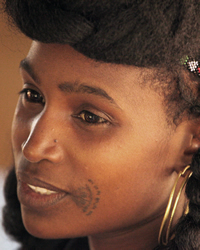Fulani, West Niger in Niger

Photo Source:
Steve Evans - Flickr
Creative Commons
|
Send Joshua Project a map of this people group.
|
| People Name: | Fulani, West Niger |
| Country: | Niger |
| 10/40 Window: | Yes |
| Population: | 667,000 |
| World Population: | 667,000 |
| Primary Language: | Fulfulde, Western Niger |
| Primary Religion: | Islam |
| Christian Adherents: | 0.00 % |
| Evangelicals: | 0.00 % |
| Scripture: | New Testament |
| Ministry Resources: | Yes |
| Jesus Film: | Yes |
| Audio Recordings: | Yes |
| People Cluster: | Fulani / Fulbe |
| Affinity Bloc: | Sub-Saharan Peoples |
| Progress Level: |
|
Introduction
The West Niger Fulani live in small family units in temporary homes. A family's wealth is determined by the number of cattle owned. They are gradually losing their traditional grazing land, and they roam the savannah to find grass and water for their cattle while trying to avoid harmful insects. Due to their semi-nomadic lifestyle, most West Fulani children do not attend school. Children spend their days working to support their families. Girls marry young through family-arranged marriages. Local governments are encouraging the West Niger Fulani to settle in one place and take up agriculture. There are oral and visual gospel materials such as the JESUS Film that can be distributed to the West Niger Fulani.
Ministry Obstacles
With few, if any, Christ followers within the West Niger Fulani community, they must hear the gospel from outsiders. Missionaries are reluctant to live in their dry, scorched land.
Outreach Ideas
Pray for the Followers of Christ
Pray for the Entire People Group
Pray for the Lord to bless the West Niger Fulani with abundant rain for their cattle and crops as a testimony of his goodness, mercy and sovereignty.
Ask God to save key West Niger Fulani leaders who will share the love of Jesus with their own people.
Pray for disciples who will make more disciples among the West Niger Fulani.